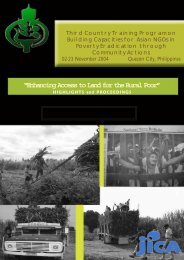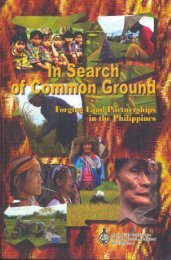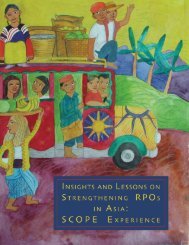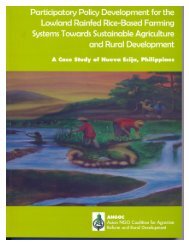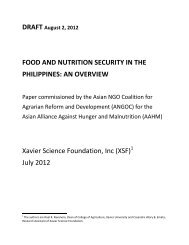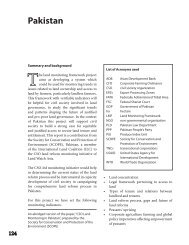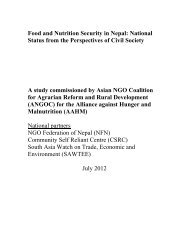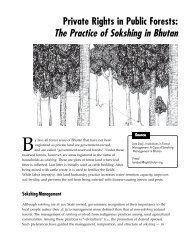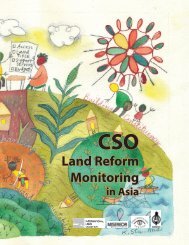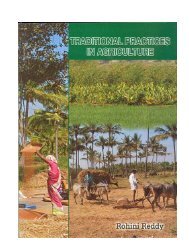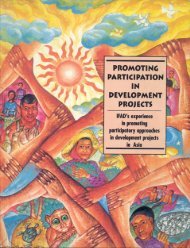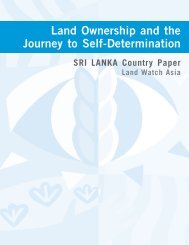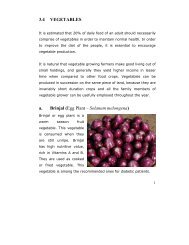Securing the Right to Land FULL - ANGOC
Securing the Right to Land FULL - ANGOC
Securing the Right to Land FULL - ANGOC
You also want an ePaper? Increase the reach of your titles
YUMPU automatically turns print PDFs into web optimized ePapers that Google loves.
SECURING THE RIGHT TO LAND<br />
54<br />
Targeting Assistance <strong>to</strong> Civil Society Groups and NGOs<br />
Involved in <strong>the</strong> Agrarian Reform Debate<br />
Development partners can promote partnerships by targeting<br />
assistance <strong>to</strong> civil society groups and NGOs involved<br />
in <strong>the</strong> debate and implementation of agrarian reform. In<br />
Bangladesh, this is necessary because <strong>the</strong> government is<br />
ei<strong>the</strong>r unwilling <strong>to</strong> make a commitment <strong>to</strong> implementing<br />
agrarian reform, or has its hands tied because of its ties <strong>to</strong><br />
<strong>the</strong> landed elite.<br />
Improving <strong>the</strong> Governance of <strong>Land</strong> Resources<br />
The governance of land resources not only determines<br />
access <strong>to</strong> land, livelihood, and economic opportunities, in<br />
<strong>the</strong> short-term, but also plays a critical role in resolving<br />
social conflicts between groups and in ensuring environmentally<br />
sustainable development in <strong>the</strong> longer term.<br />
Research, Knowledge Management and Lessons Learned<br />
from Pro-Poor <strong>Land</strong> Reform<br />
There is a need <strong>to</strong> promote <strong>the</strong> effective use of <strong>the</strong><br />
knowledge that research generates in operationalizing land<br />
policies for pro-poor development. It is important <strong>to</strong> discuss<br />
and communicate <strong>the</strong> findings from research and operational<br />
practice with policy and decision-makers at all levels. A combination<br />
of high quality, focused research and a capacity <strong>to</strong><br />
work within <strong>the</strong> policy formulation process are essential if<br />
land rights advocates are <strong>to</strong> make a contribution <strong>to</strong>ward <strong>the</strong><br />
improvement of land policies and <strong>the</strong>ir implementation. Research<br />
and networking activities must be conducted such<br />
that contact and feedback are established between and<br />
among a range of ac<strong>to</strong>rs operating at various levels of decision-making<br />
in <strong>the</strong> country, as well as at <strong>the</strong> regional and<br />
international levels.<br />
Transparent Moni<strong>to</strong>ring and Evaluation Systems and<br />
Process for <strong>Land</strong> and Agrarian Reform Programs<br />
The key <strong>to</strong>pics for evaluation and learning are: (1) <strong>the</strong><br />
impact of different approaches and ongoing programs for<br />
land distribution and agrarian reform; (2) formalization or<br />
regulation of land rights; design of land institutions and<br />
linkages of land policy and land reform; (3) land administration<br />
programs; and (4) wider development strategies and<br />
poverty reduction, including questions of prioritization,<br />
cross-sec<strong>to</strong>ral coordination, sequencing, and phasing.<br />
Recommendations for Country, Regional, and<br />
International Level Advocacy and Campaign<br />
At Country Level:<br />
1. Representatives of peasants and landless groups should<br />
have a strong presence in <strong>the</strong> national Khas <strong>Land</strong> Management<br />
Committee, and <strong>the</strong> Distribution Committee at <strong>the</strong><br />
district level;<br />
2. A legal support system needs <strong>to</strong> be institutionalized <strong>to</strong> ensure<br />
<strong>the</strong> speedy resolution of problems concerning <strong>the</strong><br />
landownership rights of <strong>the</strong> poor, and <strong>the</strong>ir choice of crops<br />
<strong>to</strong> cultivate. Existing legal aid support from NGOs and o<strong>the</strong>r<br />
institutions needs <strong>to</strong> be streng<strong>the</strong>ned;<br />
3. The Vested Property Repeal Act of 2002 should be implemented<br />
immediately in order <strong>to</strong> protect <strong>the</strong> land rights of<br />
religious minorities;<br />
4. All vested property under <strong>the</strong> government’s cus<strong>to</strong>dy should<br />
be leased out <strong>to</strong> <strong>the</strong> real owners or <strong>to</strong> <strong>the</strong>ir legal heirs who<br />
are permanent residents of Bangladesh, pending <strong>the</strong> final<br />
settlement of individual cases;<br />
5. The law of inheritance should be amended <strong>to</strong> make provisions<br />
for women’s equal right <strong>to</strong> own land;<br />
6. Efforts should be made <strong>to</strong> implement <strong>the</strong> Peace Accord<br />
(signed between <strong>the</strong> Government and <strong>the</strong> indigenous<br />
peoples of <strong>the</strong> CHT in December 1997) in a comprehensive<br />
manner, paying special attention <strong>to</strong> critical provisions that<br />
have been left unimplemented, such as <strong>the</strong> activation of<br />
<strong>the</strong> <strong>Land</strong> Commission;<br />
7. In order <strong>to</strong> resolve <strong>the</strong> deep-rooted problem of forcible occupation<br />
of Hills lands, <strong>the</strong>se issues must be addressed by an<br />
effective and empowered <strong>Land</strong> Commission, as stipulated in<br />
<strong>the</strong> Peace Accord of 1997;<br />
8. Separate laws must be enacted and implemented <strong>to</strong> promote<br />
and protect <strong>the</strong> cus<strong>to</strong>mary land rights of indigenous peoples;<br />
9. The tea plantation worker should be given special attention;<br />
10. To maximize and rationalize <strong>the</strong> utilization of land, a National<br />
<strong>Land</strong> Use Policy needs <strong>to</strong> be developed;<br />
11. Social movements and a social land watch platform needs<br />
<strong>to</strong> be created <strong>to</strong> campaign against land related corruption<br />
and <strong>the</strong> non-implementation of pro-poor and pro-women<br />
laws and policies regarding land rights and agrarian reform.<br />
12. Research and cus<strong>to</strong>mization of knowledge that already<br />
exists need <strong>to</strong> be scaled up.<br />
At <strong>the</strong> Regional and International Levels:<br />
1. Best practices in different countries in <strong>the</strong> region must be<br />
used for <strong>the</strong> campaign;



